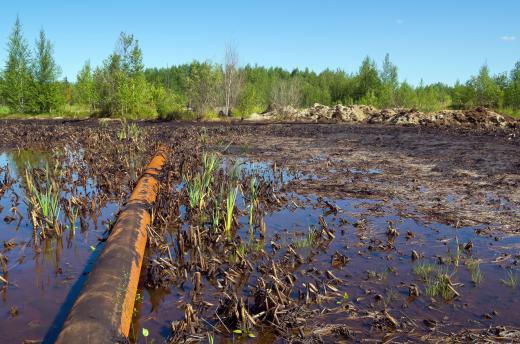A delayed coker is terminology used for a petroleum refining process that involves the further refining of residual oil byproducts after distillation of crude oil has taken place into useful fuels such as naptha and gasoline. The process was first patented in 1891 by a Russian engineer named Vladimir Shukhov, and the Shukhov cracking process is still used into 2011 to produce diesel fuel. In 1913, however, improvements to the delayed coker methodology were patented by William Burton and Robert Humphrey. This became known as the "Burton process," which doubled the quantity of gasoline that could be generated in a delayed coker. The coker unit performs a thermal cracking process on residual oil where it breaks or cracks the hydrocarbon chains of the molecules present into smaller, more useful hydrocarbons.
Before the delayed coker process became common petroleum residuum, known as "bottoms" in the industry, it was considered to be a waste product of refining that was expensive to dispose of due to the environmental risks that it posed to water supplies and so on. As of 2011, the delayed coker has become the most common type of petroleum refinery, with several other designs also existing, such as the fluid coker and flexicoker, which are focused on the production of liquified petroleum gas (LPG) and jet fuel. The end products of a delayed coker process include useful fuels in both liquid and gaseous states such as gasoline and naptha, and a solid residue composed mostly of carbon that is known as petroleum coke.

Petroleum coke has a chemical similarity to coal and can be used in coal-fired furnaces, though it is a heavily-polluting fuel source that can release dangerous compounds like lead and mercury into the atmosphere. This often means that petroleum coke has to undergo a further refining process before it can be burned as a fuel source. During separation of petroleum coke from useful crude oil compounds, most of the heavy metals and sulfur-related chemicals are concentrated in the petroleum coke. These compounds would otherwise make the beneficial fuel products unsuitable for everyday use.

A delayed coker drum operates at a temperature between 779° to 842° Fahrenheit (415° to 450° Celsius), where complex molecules break down into simpler ones, and some compounds act as free radicals to combine with others into olefins in the alkene chemical group. For instance, the compound CnH2n+2 breaks down to Cn-2H2n-3 + C2H5. The two simpler free radicals then react to form other compounds, where C2H5 + CnH2n+2 produces CnH2n+1 + C2H6. The end products of a delayed coker can be adjusted by changing the temperature of the process as well as the pressure level. A higher temperature will reduce the amount of petroleum coke that is generated, but the variation in output is relatively small. Another advantage of the delayed coker is that it can use other types of feedstock aside from vacuum distillation residue from oil refining, including waste refinery sludge and feedstock with high metal and sulfur concentrations.

Visbreaking is another thermal cracking process that breaks down long chain hydrocarbons through the application of heat. Unlike a delayed coker, it is a non-catalytic process that doesn't involve the chemical reaction of the constituent elements themselves, and it is considered to be a cleaner process that produces less waste byproducts. The visbreaking oil refining methodology is considered rather new in that it has not been widely adopted by industry as of 2011, though pilot plants for the method exist in both the United States and the Netherlands.
